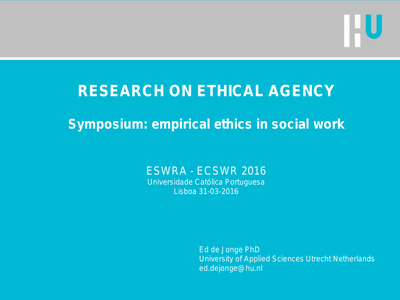Diversity implies variety. Diversity refers to the differences between people. Visible aspects – such as age, skin colour, gender, disability – and less or non-visible aspects such as cultural and social background, skills and competencies, and style of working. If you can handle diversity, you will be able to handle different kinds of people. The concept of ‘equality’ can be seen as opposite from the concept of ‘diversity’. Dutch society can be characterized as a culture of equality. Due to increasing diversity it is argued this culture of equality will eventually turn out to be unfavourable. A culture of diversity is reasoned to be an inevitable alternative. A first exploration of the characteristics of such a culture and its significance for the work of the Social Worker is being done at present.
DOCUMENT

Symposium ESWRA - ECSWR 2016: empirical ethics in social work. Objective: ethical aspects of social work (esp. at home) Structure: cooperation of the research group of UAS Utrecht Netherlands with six regional welfare organizations Method: practice based ethics research Focus on professional practice: learning from moral experiences in frontline practice (cf. Van Doorn, 2008) Hybrid approach: combining theoretical resources and professional practice (cf. Banks & Gallagher, 2009) Mixed methods: desk research, interviews, best practice units (BPU), development of ethical tools
DOCUMENT

Dit artikel presenteert de resultaten van een discursief psychologische analyse van geruchtvorming op social media. De analyse van Twitterberichten die zijn geplaatst tijdens de zoektocht naar twee vermiste kinderen heeft tot doel inzicht te verwerven in de manier waarop geruchten zich ten tijde van crisissituaties op social media ontwikkelen. In this article we present the results of our analysis of rumour construction on social media from a discursive psychological perspective. The analysis of tweets during a search for two missing kids aims to provide insight into the way rumours develop on social media during a crisis situation, as well as the interactional and rhetorical aspects of rumour construction.
DOCUMENT

This research aims to contribute to a better understanding of strategic collaborations between work-integration social enterprises (WISEs) and for-profit enterprises (FPEs) with the joint objective to improve labour market opportunities for vulnerable groups. We find that most collaborations strive towards integration or transformation in order to make more social impact.
LINK
Background Psychological aspects of labor and birth have received little attention within maternity care service planning or clinical practice. The aim of this paper is to propose a model demonstrating how neurohormonal processes, in particular oxytocinergic mechanisms, not only control the physiological aspects of labor and birth, but also contribute to the subjective psychological experiences of birth. In addition, sensory information from the uterus as well as the external environment might influence these neurohormonal processes thereby influencing the progress of labor and the experience of birth. Methodology In this new model of childbirth, we integrated the findings from two previous systematic reviews, one on maternal plasma levels of oxytocin during physiological childbirth and one meta-synthesis of women´s subjective experiences of physiological childbirth. Findings The neurobiological processes induced by the release of endogenous oxytocin during birth influence maternal behaviour and feelings in connection with birth in order to facilitate birth. The psychological experiences during birth may promote an optimal transition to motherhood. The spontaneous altered state of consciousness, that some women experience, may well be a hallmark of physiological childbirth in humans. The data also highlights the crucial role of one-to-one support during labor and birth. The physiological importance of social support to reduce labor stress and pain necessitates a reconsideration of many aspects of modern maternity care. Conclusion By listening to women’s experiences and by observing women during childbirth, factors that contribute to an optimized process of labor, such as the mothers’ wellbeing and feelings of safety, may be identified. These observations support the integrative role of endogenous oxytocin in coordinating the neuroendocrine, psychological and physiological aspects of labor and birth, including oxytocin mediated. decrease of pain, fear and stress, support the need for midwifery one-to-one support in labour as well as the need for maternity care that optimizes the function of these neuroendocrine processes even when birth interventions are used. Women and their partners would benefit from understanding the crucial role that endogenous oxytocin plays in the psychological and neuroendocrinological process of labor.
DOCUMENT

This open access book states that the endemic societal faultlines of our times are deeply intertwined and that they confront us with challenges affecting the security and sustainability of our societies. It states that new ways of inhabiting and cultivating our planet are needed to keep it healthy for future generations. This requires a fundamental shift from the current anthropocentric and economic growth-oriented social contract to a more ecocentric and regenerative natural social contract. The author posits that in a natural social contract, society cannot rely on the market or state alone for solutions to grand societal challenges, nor leave them to individual responsibility. Rather, these problems need to be solved through transformative social-ecological innovation (TSEI), which involves systemic changes that affect sustainability, health and justice. The TSEI framework presented in this book helps to diagnose and advance innovation and change across sectors and disciplines, and at different levels of governance. It identifies intervention points and helps formulate sustainable solutions for policymakers, administrators, concerned citizens and professionals in moving towards a more just and equitable society.
MULTIFILE

Wereldwijd onderzoek: Hoe gebruiken nieuwsmedia social media? Jongeren lezen geen krant meer, ze kijken op hun smartphone die ze altijd bij de hand hebben. Binnen het lectoraat social media en reputatiemanagement van NHL hogeschool te Leeuwarden heeft een groep internationale studenten in 12 landen onderzoek gedaan. Hierbij hebben ze meer dan 150 social media sites bestudeerd van nieuws media. De resultaten maken deel uit van een internationaal onderzoek van NHL Hogeschool en Haaga Helia University. De onderzoeksvraag was: Wat speelt zich af in de nieuwsmedia? Persbureaus kunnen het overzicht gebruiken om hun social media te optimaliseren. En voor ieder die journalistiek een warm hart toedraagt is het interessante informatie over de nieuwsmedia in een overgangssituatie (2nd edition)
DOCUMENT

Purpose Worldwide, there are 30 million people with dementia (PWD) in 2009 and 100 million in 2050, respectively.These numbers show the need for a change in care for PWD. Leisure is one of these care aspects. Leisure activities can support PWD in several ways: meeting basic needs, providing comfort and social interaction, and reducing boredom, agitation, and isolation. An exemplary activity targeted at meeting these needs is ‘De Klessebessers (KB)’ (The Chitchatters), which aims to stimulate social interaction among PWD and provide comfort with supporting technology. This is innovative since technology for PWD generally concentrates on safety and monitoring activities. The activity comprises a radio, television, telephone, and treasure box. Method This study’s focus follows from the original aim of the KB-designers; to stimulate social interaction. In a nursing home and day care centre, the KB game was played with different groups of PWD (n=21: 12 females, 9 males, mean MMSE=17, range 3-28). In the morning KB (with technology), and in the afternoon an activity called ‘Questiongame’ (without technology) were played for 45 minutes. These activities were played twice in a two-month period, and outcomes were compared in terms of impact on social interaction. Group sizes ranged from 3 to 8 PWD assisted by 1 or 2 activity therapists. Two researchers observed the players during the activity with the Oshkosh Social Behavior Coding (OSBC) scale, which encompasses both verbal and nonverbal social and nonsocial behaviour. These behaviours can have a person-initiated and otherinitiated character (quantitative study). A total of 6 activity therapists were interviewed on the KB afterwards (qualitative study). Results & Discussion The quantitative results showed significantly higher scores for KB for the total of social interaction compared to Questiongame. Most of the behaviour is other-initiated (activity therapist). PWD with a lower MMSE score showed more non-verbal behaviour. For PWD with a MMSE score below 7, there was no difference in social interaction between the two activities. According to the qualitative research, KB triggered more social interaction, since the movies and music were stimulating the players to initiate a conversation, to which other players responded. The results of this research correspond with earlier research, which concludes that leisure activities with technology can show positive results on well-being.
LINK
Designers have grown increasingly interested in social consequences of new technologies. As social impacts become increasingly important it might be fruitful to understand how social impacts develop and how a designer can anticipate these consequences. In health care practices, for instance, it is important to control unintended social impacts at forehand. Social impact is an outcome of the mediating effect of a technology with its social environment. Human behaviour in a social environment can be analysed from the perspective of a social ecological system. To anticipate social impacts simulations of social practices are needed. To simulate practices the persona approach has been adapted to a screenplay approach in which the elements of a social ecology are used to gain a rich description of a social environment. This has been applied for a 'Heart Managers' case. It was concluded that the screenplay approach can be used for a systematic simulation of future social impacts.
DOCUMENT

This paper was first presented as a background paper to the invitation conference The social quality of Europe, organised in Amsterdam, 8-10 June 1997 by the Dutch Ministry on Health, Welfare and Sports.
DOCUMENT